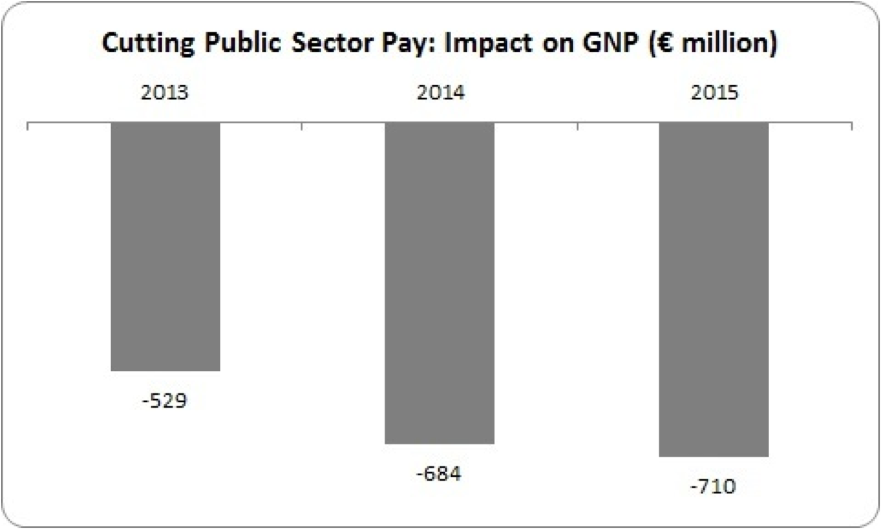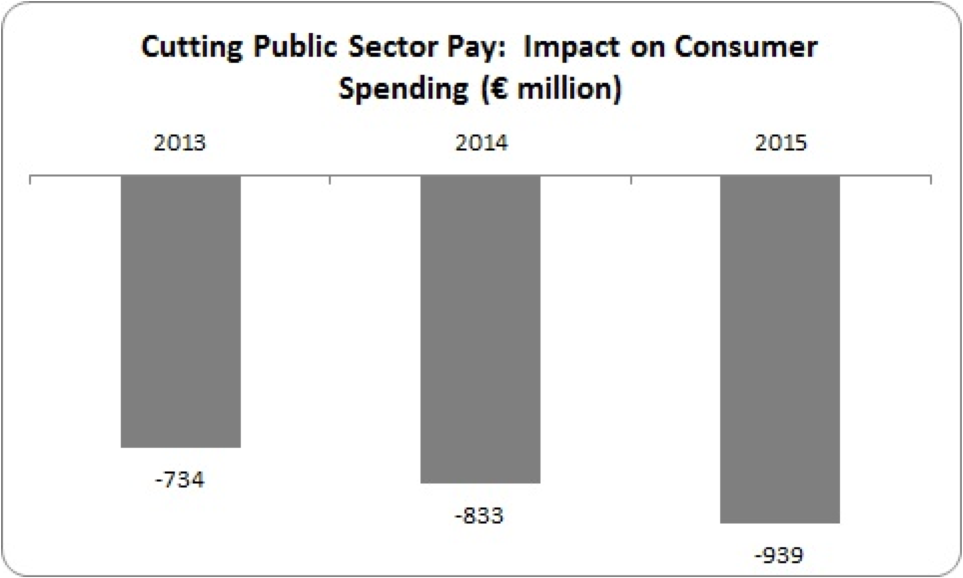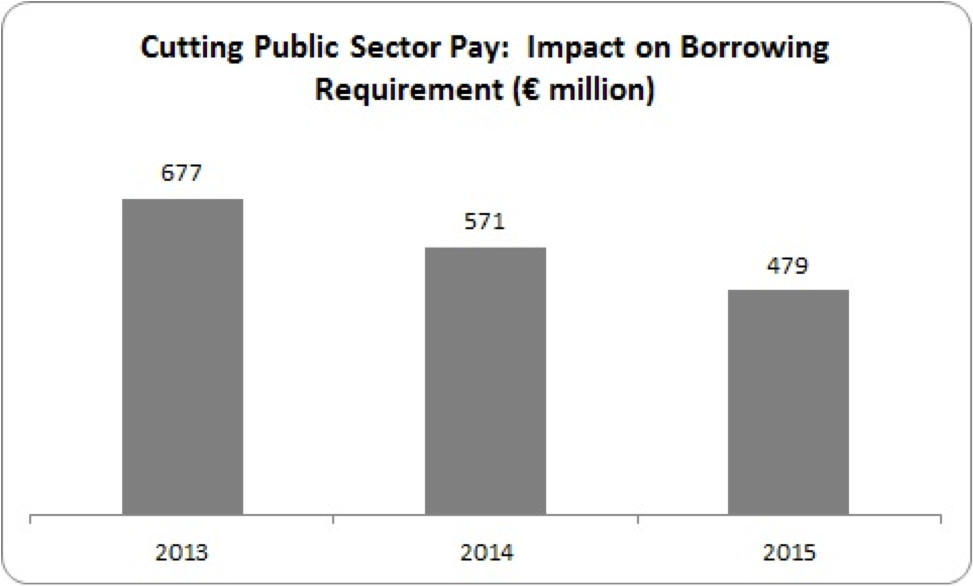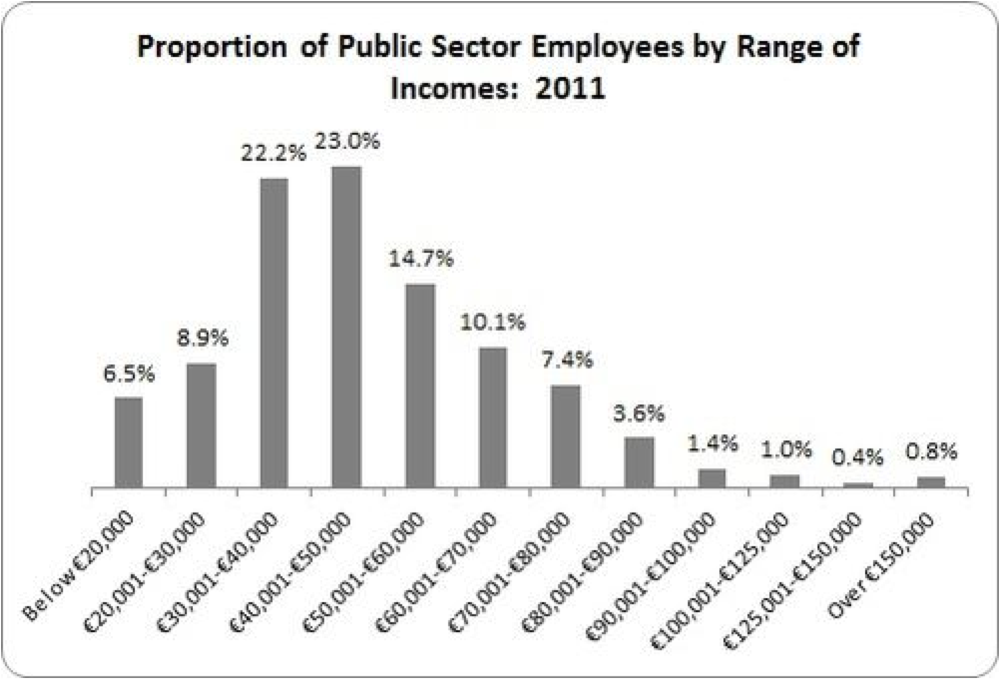Scraping the bottom of a broken barrel

We have had cuts in both public and private sector pay. The problem is that too few people ask the fundamental question – why is it that after all the cuts of past, we still are where we are? By Michael Taft.
It’s open season on the Croke Park Agreement and on public sector workers in particular. Croke Park should be scrapped, torn-up, renegotiated, whatever – just cut wages. Some of the arguments are Pythonesque. Dr Eddie Molloy, in particular, tries to co-opt Jim Larkin into his proposals to cut workers’ wages (here and here). I suppose now we’ll get someone co-opting William Martin Murphy into the argument for raising the corporate income tax.
Dr Eddie claims the Government should plead inability to pay, citing deterioration in the economy and public finances that were not foreseen at the time the agreement was made. Strangely, he fails to connect the dots – or even admit there are dots to connect:
· Pension levy · Budget 2010 pay cut · reduction of public sector employment · real pay cuts under the Croke Park Agreement (after inflation) · economic and fiscal deterioration
We’ve had pay cuts, we’ve had downsizing and we are still in a mess. One might expect a consultant to go back and see if there is some connection, a cause and effect, and ask that most fundamental question - Is what we’re doing producing the effect we desire? Instead, Dr Eddie, seeing the tired old horse stumbling to the ground, demands that we whip harder.
If Dr Eddie can’t or won’t ask those fundamental questions, we can. His contention that economic deterioration is making things harder is correct. What would happen if we cut public sector pay by, let’s say, €1 billion (a 7% across the board cut)?
 The impact on the domestic economy would be considerable. In the first year alone, over half a billion euro would be wiped out. Over the three year period, nearly €2 billion would be wiped out. It is noteworthy that Dr Eddie, when describing the deteriorating situation, points out that:
The impact on the domestic economy would be considerable. In the first year alone, over half a billion euro would be wiped out. Over the three year period, nearly €2 billion would be wiped out. It is noteworthy that Dr Eddie, when describing the deteriorating situation, points out that:
“ ...growth projections for the economy have not materialised…”
Yet, he proposes a policy that will ensure that growth will fall even further. Why would he do that? This is a classic example of proposing a course of action without thinking through the impact.
I’m sure Dr Eddie would support proposals to increase employment. After all, rising employment means more tax revenue, lower unemployment costs, and greater economic activity. However, according to the ESRI, there will be private sector job losses if public sector wages are cut. Keeping with the proposal to cut €1 billion in wages, they estimate that up to 4,000 jobs will be lost by 2015 – but we should remember that this estimate comes from 2010, against a background of projected growth. Given the deteriorating situation since then, we could expect this job loss figure to be higher. Again, why would Dr Eddie propose a policy that will cut more jobs out of the economy?
How many businesses will go out of business arising from a public sector pay cut? This is difficult to quantify. But we can measure the impact on consumer spending.
 In 2013, €734 million in consumer spending will be lost by a cut in public sector wages. This rises to nearly a billion euro by 2015. Over the three years, €2.5 billion will cut out of consumer spending. This means fewer sales, and less turnover and revenue for business. How many will go under? Dr Eddie doesn’t refer to this, even though it is obvious that if you cut people’s disposable income, there will be a drop in consumer spending – especially with so many households grappling with debt.
In 2013, €734 million in consumer spending will be lost by a cut in public sector wages. This rises to nearly a billion euro by 2015. Over the three years, €2.5 billion will cut out of consumer spending. This means fewer sales, and less turnover and revenue for business. How many will go under? Dr Eddie doesn’t refer to this, even though it is obvious that if you cut people’s disposable income, there will be a drop in consumer spending – especially with so many households grappling with debt.
Ok, so growth will be cut, private sector jobs will be lost, and consumer spending will fall, threatening more businesses. But Dr Eddie, like so many others who demand we take ‘tough’ decisions, may say that this is the pain we must take to reduce the deficit. This raises the question: how much deficit will be reduced by cutting public sector pay by €1 billion? The answer is, not much.
 In the first year, the borrowing requirement will fall by €677 million. However, as the deflationary impact of the cuts becomes embedded in the economy, the reduction in the borrowing requirement falls to €479 million by 2015. In other words, the ‘saving’ to the Exchequer is less than 50% of the headline cut.
In the first year, the borrowing requirement will fall by €677 million. However, as the deflationary impact of the cuts becomes embedded in the economy, the reduction in the borrowing requirement falls to €479 million by 2015. In other words, the ‘saving’ to the Exchequer is less than 50% of the headline cut.
Let’s put this into perspective. Between 2012 and 2015 the Government is hoping to reduce the borrowing requirement by €11.9 billion. Cutting public sector pay will reduce that amount by €479 million. 4%. Dr Eddie’s proposal will have the effect of cutting the borrowing requirement by 4% of the amount needed. Growth will be cut, private sector jobs will be lost, consumer spending will put domestic businesses under even more pressure – but at least we have reduced the borrowing requirement by 4%. Is this ‘tough’ decision either efficient or effective?
But we don’t have to go through charts and graphs to figure this out. Cutting people’s wages – whether private or public sector – during a domestic demand recession is not likely to turn out well. We can get a better sense of this by looking at the range of income groups that will be hit.
 Over 60% of public sector workers earn less than €50,000 a year – and this doesn’t take into account the impact of the pension levy. There are less than 15% on higher incomes (above €70,000) and a minute 2% in six figures.
Over 60% of public sector workers earn less than €50,000 a year – and this doesn’t take into account the impact of the pension levy. There are less than 15% on higher incomes (above €70,000) and a minute 2% in six figures.
To cut into low and average workers’ wages, regardless of who their employer is, is to invite all manner of problems – and not just those listed above. Cutting wages could see a rise in social protection payments, in particular Family Income Supplement. For instance, a worker on €28,000 with one child experiencing a 7% wage cut will end up costing the Department of Social Protection an additional €800 per year in FIS payments.
Cutting wages could also see a rise in mortgage arrears, which will rebound on the Exchequer if this contributes to a growing destabilisation of bank finances, resulting in higher capitalisation payments or less credit in the economy.
These are just two instances of perverse consequences which will undermine deficit reduction – and which those who claim to be taking touch decisions just ignore or are unaware of.
Ultimately, we’re back to the same old barrel, scraping and scraping until the barrel is unfit for purpose, leaking all over the productive economy. We have had cuts in both public and private sector pay. And, as they say, we are where we are. The problem is that few people ask that fundamental question – why is it that after all the cuts of past, we still are here?
Of course, if we did ask that might lead to new thinking – innovative, strategic thinking – that will ensure that what we are doing is producing the results we desire. That might lead us away from the policies of cuts and austerity.
And we dare not do that. So, keep to the programme, steady on, there is no alternative. All we have to do is whip harder.
Image top: Der_Krampus.
